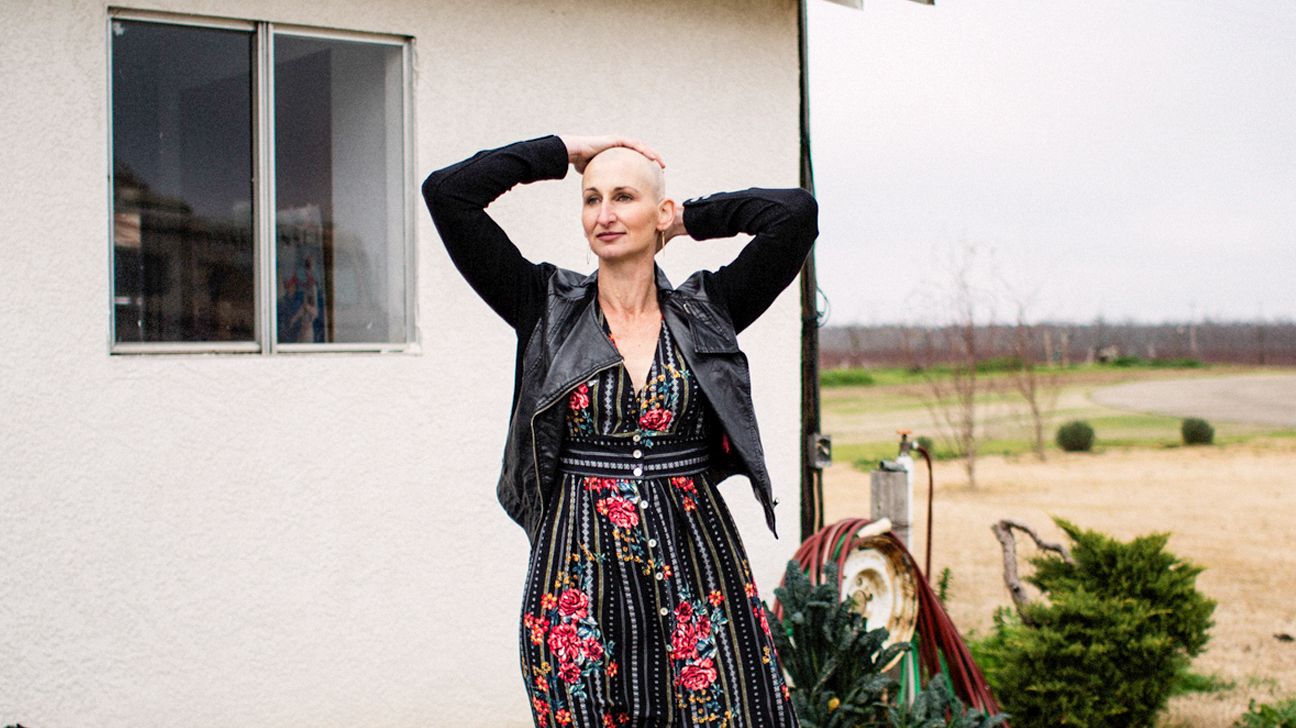6 Tips for Coping with Hair Loss and Your Chronic Condition
August 25, 2021
Content created for the Bezzy community and sponsored by our partners. Learn More

talia herman/Getty Images
Hair loss was a blow to my identity, but I’m slowly learning to come to terms with it.
Hair loss is a common symptom for many chronic conditions. It can also be one of the toughest to come to terms with.
Our hair is a big part of our identities, so when we start to lose it, it can feel as if we’re losing ourselves. It can also be an outward sign that we’re sick during what is usually a period of invisible illness.
More than anything, it might come as a massive shock to some of us when we suddenly start losing our hair.
Hair loss is a big part of my chronic condition, lupus. I’m currently going through the biggest flare I’ve experienced in a decade, and I’m also experiencing a significant amount of hair loss.
I won’t lie, it’s something I struggle with. I have very distinctive auburn locks that are an integral part of my identity, so to find them coming out in clumps in the shower is upsetting.
However, I’m slowly learning to come to terms with it. Here are some tips to help you feel better about hair loss related to your chronic condition.


Feel your feelings
It’s OK to be upset, but the worst thing you can do in this situation is bottle up your feelings and fret over it more. This could actually make your hair loss worse, as stress can be another trigger.
Take some time to acknowledge how you feel. But, instead of wallowing and allowing yourself to feel worse, make a plan.
This could include setting up some time to talk with your doctor about what you’re experiencing, looking into dietary changes you can make, or scheduling an appointment with a stylist who can give you some hair tips.
Talk with someone who understands
Opening up can help relieve the burden. Whether you talk with your partner, friends, family, or a therapist, it will help to get it out there.
I always feel better after I’ve spoken with my friends who also live with chronic conditions — they understand it the most.
“Talk about it with friends and family, but I also would suggest joining your local alopecia discussion group. They are great friendly people, who can advise you in every aspect,” says Jonathan Palmer, PhD, the founder of HairKnowHow, a company that helps people better understand the health and type of their hair.
Switch up your styling routine
Instead of tight ponytails, wear your hair loosely, so you don’t add extra pressure to the roots.
You should also use your hair dryer and other heat tools as little as possible, as these tools can damage your hair.
“If you have balding and thinning spots, consider changing your part or wear a loose ponytail to conceal those areas,” says stylist Jill Turnbull, the founder of Jill Turnbull Beauty.
“These small changes can have a major impact on one’s mental health and confidence,” Turnbull adds.
Optimize your diet
Nutrient deficiency can go hand-in-hand with chronic conditions that cause malabsorption, such as inflammatory bowel disease (IBD). It’s also linked to hair loss.
Eating a diet rich in protein may help with hair loss. Foods containing vitamin A and C can also be beneficial, such as:
- berries
- sweet potatoes
- spinach
- sweet peppers
- avocados
If you aren’t able to get all the nutrients you need through your diet, supplements may help.
A 2018 research review found that supplementing vitamins A, B, C, D, iron, selenium, and zinc in the form of multivitamins can aid hair regrowth. You can find everyday multivitamins at most grocery and drug stores.
Try something new
Instead of holding onto your old hairstyle or mourning your lost style, now is the time to experiment.
Get a new cropped ‘do, try out a mohawk, or embrace a cute pixie style. You could brave the shave and donate money to charity, perhaps even have an event where others do the same.
If you’re feeling self-conscious about losing your hair, you can try out different wigs or headscarves that can be changed to match your style.
Accept it
This might sound like something that’s easy for me to say, but that’s the reason it’s at the very end. Acceptance comes with the knowledge from all the other work you put in. It can’t be rushed.
Nobody is forcing you to accept it, but when you do, it can be freeing. Self-acceptance gives you the permission to be happy.
“The best advice I would give you is to own it, and not let it define you,” Palmer says. “With or without your hair, you are still you. Do what is best for you, but you must, like, love, and embrace yourself again.”
When to see a doctor
If your hair loss is sudden and accompanied by other symptoms, it may signal that your condition is worsening or requires supervision. It might be time to schedule a check-up with your doctor.
Remember that hair loss is very normal with many conditions, but living in misery isn’t a given.
Article originally appeared on August 25, 2021 on Bezzy’s sister site, Healthline. Last medically reviewed on August 25, 2021.
Medically reviewed on August 25, 2021
6 Sources


Like the story? React, bookmark, or share below:
Have thoughts or suggestions about this article? Email us at article-feedback@bezzy.com.
About the author